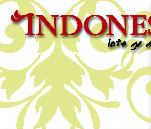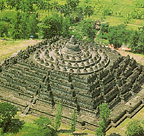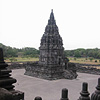|
|
History
The strategic position of Indonesia, has had distinctive
influences on both the political and economic history of the islands.
Fossils of "Java Man" (Pithecanthropus Erectus)
which date back some 500,000 years, were discovered near the village
of Trinil in East Java by Dr. Eugene Dubois in 1809. This discovery
was followed by other finds in later years which are evidence of
Java's earliest inhabitants.
Major migration movements to the Indonesian archipelago have been
traced as far back as 3,000- 500 B.C. These first migrants were
of Mongoloid stock from China and Tonkin and have been credited
with introducing new Stone, Bronze and Iron Age cultures as well
as the Austronesian language.
Indonesia came under the influence of a mighty Indian civilization
through the gradual influx of Indian traders in the first century
A.D., when great Hindu and Buddhist empires were beginning to emerge.
By the seventh century, the powerful Buddhist Kingdom of Sriwijaya
was expanding and it is thought that during this period the spectacular
Borobudur Buddhist sanctuary was built in Central Java.
The thirteenth century saw the rise of the fabulous Majapahit Hindu
empire in East Java, which united the whole of what is now modern
day Indonesia and parts of the Malay peninsula, and ruled for two
centuries.
Many monuments spread through Java such as the Prambanan temple
complex near Yogyakarta, the Penataran temple complex in East Java
as well as the ethereal temples on the Dieng Plateau are remnants
of this glorious period in Indonesia's history.
more...
|









